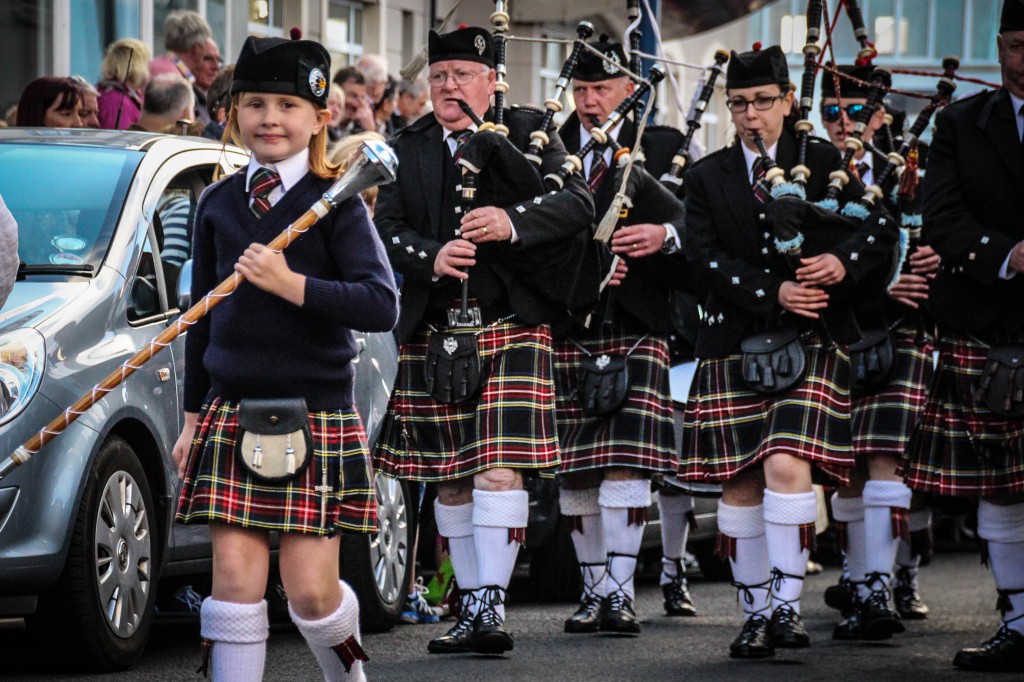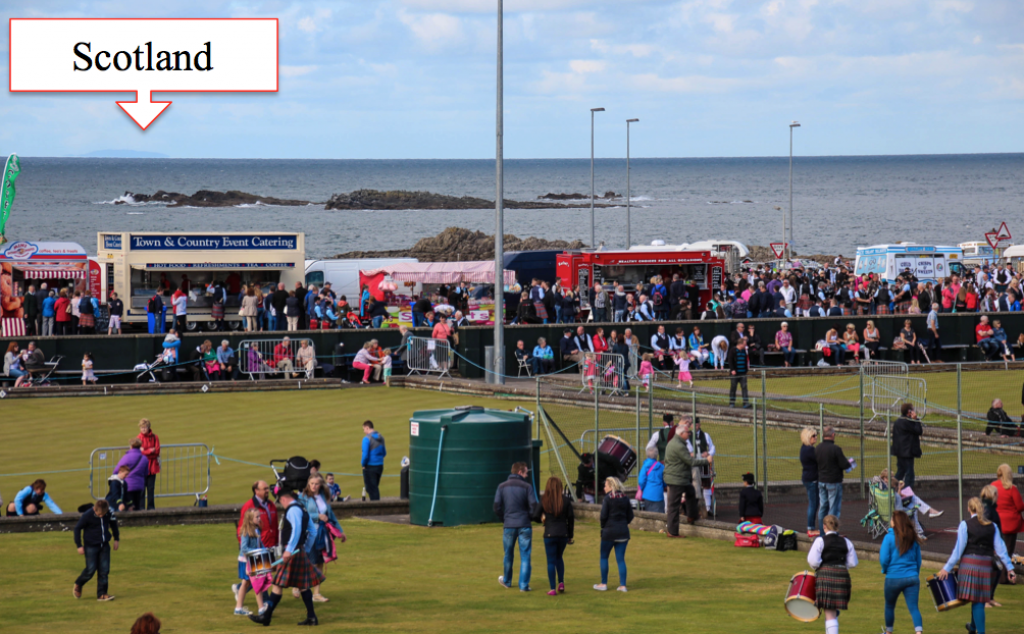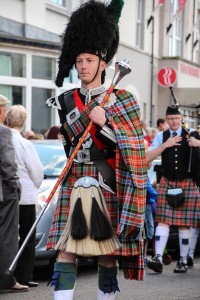 The sound of hundreds of bagpipe drones drifts through the breeze of the quiet Northern Irish coastal town of Portrush. The sun shines on the crowd that is perched on a hillside overlooking nearly 50 Royal Scottish Pipe bands, assembled to compete at the North West Pipe Band Championships. Men, women, and children of all ages stroll through the crowds wearing their full pipe band garb, down to the kilts and socks. The hill overlooks the scenic coastline where, off in the distance, a hazy Scottish island can be seen: a reminder of the close proximity, culture, and heritage these two countries share.
The sound of hundreds of bagpipe drones drifts through the breeze of the quiet Northern Irish coastal town of Portrush. The sun shines on the crowd that is perched on a hillside overlooking nearly 50 Royal Scottish Pipe bands, assembled to compete at the North West Pipe Band Championships. Men, women, and children of all ages stroll through the crowds wearing their full pipe band garb, down to the kilts and socks. The hill overlooks the scenic coastline where, off in the distance, a hazy Scottish island can be seen: a reminder of the close proximity, culture, and heritage these two countries share.
Next month, Scotland will be voting on whether to remain part of the United Kingdom or become an independent nation. This could have many economic, political, and social impacts on other member nations of the United Kingdom, which would include Northern Ireland and Wales. The decision will also have an impact on the thousands of Scots who originate from Scotland but are currently residing elsewhere and therefore have no vote in the upcoming decision.

The Big Picture
On September 18, Scottish residents will head to polls to decide the answer to a question: should Scotland become an independent country? According to The Telegraph and the BBC, the major voting concerns at this point include:
- The North Sea Oil revenues
- The removal of the Trident nuclear submarines in Faslane
- What currency would be used
- Border Control
- Re-application to enter the European Union, which could take many years
- How the economies of Scotland and England would be integrated.
Bruce Strang is a Scottish businessman who has lived in Northern Ireland for the past seven years. He has reservations about a “yes” vote based on the remaining unanswered questions and a seemingly ambiguous plan proposed for Scottish independence. Strang Said:
“We’re about to go into a vote, and nobody knows if it’s going to be the Euro, or weather it’s going to be the pound… It makes a massive difference to companies who are currently trading in Scotland using the pound. All these things have not been answered yet, and nobody really knows. If I was pushing the button, I’d be sort of thinking, well it needs a lot more concrete statutes put in front of everybody saying, ‘look, if we go independent, this is what’s going to happen.’ In the current melting pot, I think there’s a lot of concern at this present time, and I don’t think that’s a great platform for moving forward.”
A Close Bond

Northern Ireland and Scotland have much in common, ranging from their Celtic heritage to their relationship with England. The BBC quotes the Irish-born Scottish National Party campaigner Feargal Dalton in regards to the cultural connection between the two countries. “I came up to Scotland for the first time in June 1994 on a training exercise in the Scottish Highlands and it was only when I saw the place-names on the maps and how close the Gaelic language was to the Irish language that I realized how strong the cultural links were between Scotland and Ireland.”
According to the BBC, these close, cousin-like connections between the two countries would make the impact of a “yes” vote especially influential on Northern Ireland. Historically, residents of both countries have migrated both ways, sports fans in Northern Ireland travel regularly to Scotland to support the Celtics and Rangers, an students often choose to pursue degrees in Scottish Universities. The relationship between these two regions is close and ancient.
Liz Thompson is another Scottish transplant in Northern Ireland. Thompson specializes in horticulture and works in a garden center in Portrush, but was born and raised in Eirshire on the west coast of Scotland. She acknowledges the connection between the lands going back as early as the ice age, when the countries were geographically united. To this day, the people continue to be connected through migrant patterns back and forth. Thompson’s own family tree line can be traced back to Ireland in the 1600s.
Belonging to Two Worlds
Only current Scottish residents will be allowed to vote on the matter next month, leaving both Strang and Thompson no say in determining the future of a country that they both still consider home. “There’s a lot of Scots that are from Scotland and are living elsewhere in the world that don’t have a say.” Strang said. Though Strang currently lives in Northern Ireland, he keeps in mind the possibility of returning to Scotland, and how that possibility is influenced by the outcome of next month’s vote. Concerns of residency and citizenship, economic stability, and politics are at the front of his mind.
Thompson has now been in Northern Ireland for 16 years, and has a slightly different take on the voting situation. “I kind of understand the point. I mean, I choose not to live there, so I do take the point that I don’t have a vote,” said Thompson. “But I do feel a bit resentful for the people who have only been there for months to have the vote.”
“I think we should have a say,” Strang expressed. “If you were born in Scotland, and you wish to participate, there should be some sort of voting process that would allow you to have some sort of say. I mean, who’s to say that we wouldn’t want to go back to Scotland some day.”
Thompson, like Strang, shares the opinion that there are too many unanswered questions at this point. “I don’t know if Scotland can sustain itself on its own without that oil. I’m not convinced in the long term. It’s a nice romantic idea, for Scotland to be on its own. I really feel, deep down, that its sustainability that it comes down to. I would just absolutely hate for it to go wrong on them.”
However, the voting itself will have had an impact, regardless of the result. “I think it’s a wakeup call for Westminster,” Strang concluded. “If it doesn’t go through, I think they need to do an awful lot more to ingratiate themselves with the Scottish people, which is going to be very hard.”
Or, as Thompson puts it, politics could go the other direction after the vote. “I tell you what is a big fear, that if the vote comes back no, is Westminster going to crap on Scotland from a great height?”
Want to Read More?
Understanding the United Kingdom politics and government:
About Scotland’s Upcoming vote for Independence:
- HSBC chief says Scottish independence could prompt capital flight
- Scottish Independence: The issues concerning voters
- Scottish Independence: Will Scots living in England be able to vote in the referendum?
- What will independence mean for citizenship and migration?
About The Impact of Scotland’s potential Independence on Northern Ireland:
- Scottish Independence: Could it be a Ticking Time Bomb for Northern Ireland?
- Scottish Independence: How would ‘yes’ Vote affect Northern Ireland?
- Scottish Independence: The arguments from Celtic cousins
- Scottish Independence: Yes vote could spark unionist crisis in NI
About The North West Pipe Band Championships
